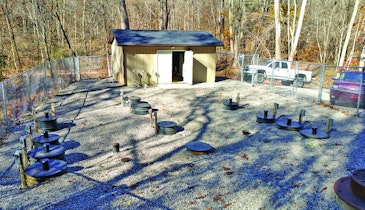Interested in Systems/ATUs?
Get Systems/ATUs articles, news and videos right in your inbox! Sign up now.
Systems/ATUs + Get AlertsThe Maryland Board of Public Works in June approved $14 million in grant funding to help upgrade septic systems in rural parts of the state. The money comes from the Bay Restoration Fund and is aimed at reducing the amount of nitrogen discharged to the Chesapeake Bay. Financial assistance for homes and businesses is based on a sliding income scale to cover up to 50 percent of the cost to replace a failing septic system. The funds can also be used for new construction. The program is administered by the state’s 23 counties with a focus on upgrading systems located in critical areas – those within 1,000 feet of tidal waters, wetlands and tributaries that drain the bay.
Collaborative agreement sets goal to reduce phosphorus in Lake Erie
Michigan, Ohio and Ontario have signed a joint agreement to reduce phosphorus in the western Lake Erie basin by 40 percent by 2025. The chemical is blamed for algae blooms that degrade water quality in the lake, including one last year that cut off water supplies to about 400,000 people around Toledo and southeast Michigan. Ohio has already passed a new law banning the land-spreading of manure and other fertilizers on frozen ground. Michigan, which regulates the practice, will be looking at prohibiting the practice, as well. Leaders of the two states and one Canadian province signed the Western Basin of Lake Erie Collaborative Agreement on June 13. It calls for them to develop their own plans and timelines to meet the 40 percent goal, with an interim goal of a 20 percent reduction by 2020.
COWA supports bill to promote recycling wastewater in California
As the state suffers through a fourth year of drought, the California Onsite Water Association is publicly backing a bill to establish water-quality standards for recycling wastewater for use in internal plumbing of residential and commercial buildings. AB 1463 would promote the use of graywater, rainwater and other water captured on site for things like flushing toilets and urinals. It would require the State Water Resources Control Board to establish distribution, monitoring, and reporting requirements. It would not include water from toilets, sewers or onsite wastewater systems unless the board establishes “additional standards, monitoring, and reporting requirements for that water necessary to protect public health, safety, and the environment,” according to the text of the bill.
In a letter to bill sponsor Assemblyman Mike Gatto (D-Glendale), COWA states, “Increasing the usage of recycled water for non-potable purposes is one way Californians can use water more efficiently and has the potential to play a significant role in our ability to maximize the sustainable yield for the waters of this state, a most precious resource.” Saying it is vital to reduce barriers to onsite water recycling systems, COWA also called for more action to allow the use of water-saving technologies. “We encourage legislation that directs agencies to work together to break down the overly conservative barriers to reuse that currently exist within our state. Our reuse laws were originally drafted many years ago, before the 30 plus years of technological advances in this rapidly changing industry.”
COWA, which recently dropped the word “waste” from its name and is now the California Onsite Water Association, also says it supports more opportunities to reuse black water.
Michigan residents of a mobile home park displaced due to failed septic
A failed septic system has forced 33 families to find new places to live after their mobile home park decided to close rather than hook up to the municipal sewer system. The Village on the Lake in White Lake Township was ordered to either connect to the sewer system or vacate the property in a consent decree with the Oakland County Health Department.
Township officials say it would have cost $400,000 to bring sewer service to the park. The owner decided to close the mobile home park after telling residents they either had to move by the end of June or start paying $2,000 a month rent, which was about $500 per lot.
Health Department officials, who regularly monitor mobile home parks, noticed standing water on the property earlier this year and found it was contaminated water from the septic drainfield. It now appears the property will be the location of a new hotel, conference center and restaurants.
New tax credit in place for cesspool replacement in Hawaii
A bill to provide tax credits for those replacing cesspools was signed by Hawaii Gov. David Ige (D-Pearl City) on June 12. The last state to still allow new cesspools, Hawaii will provide up to $10,000 in tax credits for converting to a septic system, aerobic treatment unit, or connecting to a sewer system. With about 90,000 in use and around 800 news ones each year, the Department of Health has been working on a proposal banning new cesspools but has faced opposition. It issued rules in 2014 to require the conversion of cesspools upon sale of property, but couldn’t get then-Gov. Neil Abercrombie to sign them before he left office. So far, legislative efforts to ban cesspools have not succeeded and a bill to do so appears to have stalled this year.
The tax credit is good through 2020 with priority going to homes near drinking water wells and within 200 feet of shorelines, streams and wetlands.
Arizona DEQ soliciting comments on time-of-transfer inspection changes
The Arizona Department of Environmental Quality has requested feedback from stakeholders as to the future of its required inspection rules when properties change ownership. Current rules require an inspection within six months prior to transferring ownership. In a June memo, the department requested input about eliminating the state program or transitioning responsibility to interested counties over 12 to 18 months. ADEQ has said it doesn’t have the staff or funding to properly administer the Notice of Transfer program and there are sufficient environmental protections in existing onsite rules. The department scheduled a listening session in July to receive feedback, but has not said when it will make a decision.






